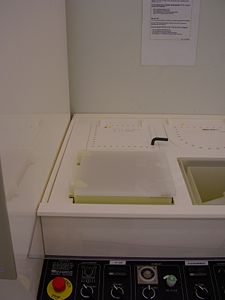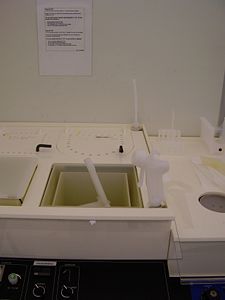Specific Process Knowledge/Wafer cleaning/7-up & Piranha
Feedback to this page: click here
Cleaning of wafers or masks
Cleaning of wafers or masks with sulphuric acid can be done either in a dedicated tank "7-up" or in the fume hood in a beaker "Piranha". Both 7-up and Piranha removes heavy organics. Always use one of these after KOH etch or hot phosphoric acid etch to remove alkali ions before further processing. 7-up and Piranha are also used as cleaning solutions after stripping resist.


The user manual, user APV and contact information can be found in LabManager: 7-up 6" info page in LabManager or 7-up (masks) info page in LabManager
The APV for working with piranha in fumehood can be found by clicking here
Comparing the 7-up cleans and Piranha clean
| 7-up wafers | 7-up Masks | Piranha | |
|---|---|---|---|
| General description |
Cleaning of wafers using the dedicated tank in cleanroom D3. |
Cleaning of masks using the dedicated tank in cleanroom D3. |
Cleaning of wafers using a beaker in the fumehood in cleanroom B1. Used for glass wafers or wafers with metal or other materials that you are not allowed to put in the 7-up for wafers or masks. |
| Chemical solution | 98% Sulfuric acid and Ammonium sulfate | 98% Sulfuric acid and Ammonium sulfate | 98% Sulfuric acid and Hydrogen peroxide 4:1 add H2O2 to H2SO4 |
| Process temperature | 80 oC | 80 oC | ~70 oC the chemicals will heat up to working temperature during mixing, therefore be careful! First pour H2SO4 into the beaker then add H2O21. |
| Process time | 10 min. | 10 min. | 10 min. |
| Allowed materials |
|
|
All materials (in beaker). |
| Batch size |
1-25 4" or 6" wafers |
1-25 4" or 6" wafers or 1-4 5" masks |
1-5 4" wafer at a time |
| Size of substrate |
4-6" wafers |
4-6" wafers or 5" masks |
All sizes that can fit into the beaker in a dedicated holder |
Note 1: In preparing a solution involving an acid, always add the acid last. The exception to this rule is Piranha, in which case you add H2O2, which is a very strong base, to H2SO4, which is a very strong acid. This is done because it is potentially explosive and at the very least will cause the solution to become very warm.
